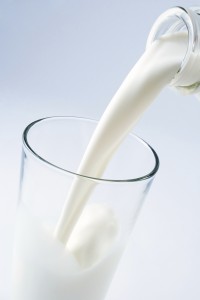The organic truth: Research shows organic provides a multitude of benefits
 In case the sensationalized sentence “going fully organic would kill more than 13,000 people each year” didn’t tip you off, the opinion piece “Organic food is great business, but a bad investment” by Bjorn Lomborg published in USA Today is not based in reality.
In case the sensationalized sentence “going fully organic would kill more than 13,000 people each year” didn’t tip you off, the opinion piece “Organic food is great business, but a bad investment” by Bjorn Lomborg published in USA Today is not based in reality.
The article attacks the health and environmental benefits of organic, but lacks any scientific backing. The few citations for scientific articles that are included are either out of date or don’t support the argument being made by the author.
For example, Mr. Lomborg cites the 2012 Stanford study that failed to find a significant difference between nutrition levels in organic versus conventional food and then erroneously states that this is the largest comparison of its kind. However, a broader, and more recent study published in the British Journal of Nutrition used more accurate meta-analysis methods and more recent data points than the Stanford Study. This new study found that organic produce has up to 69% higher antioxidant levels than their conventional counterparts. The British Journal of Nutrition study did agree with the Stanford study cited by Mr. Lomborg in one regard: organic products consistently have lower frequencies and levels of pesticide residues than conventional products.
 Mr. Lomborg also cites a study published in 2016, which he claims shows that organic products are not more nutritious than conventional. This is flat out wrong. The study actually strongly corroborates a multitude of studies to come out in the last few years showing that organic dairy and meat have a more nutritious fatty acid profile than their conventional counterparts. Mr. Lomborg apparently did not read the full article, because if he had he would have read that the conclusion states “the different composition of fatty acids found repeatedly in organic products is certainly an advantage for the consumer’s health. In fact, the polyunsaturated fatty acids found in greater concentrations in organic foods are associated with the prevention of various diseases. Therefore, the consumer would also benefit from the fatty acid composition of organic food.”
Mr. Lomborg also cites a study published in 2016, which he claims shows that organic products are not more nutritious than conventional. This is flat out wrong. The study actually strongly corroborates a multitude of studies to come out in the last few years showing that organic dairy and meat have a more nutritious fatty acid profile than their conventional counterparts. Mr. Lomborg apparently did not read the full article, because if he had he would have read that the conclusion states “the different composition of fatty acids found repeatedly in organic products is certainly an advantage for the consumer’s health. In fact, the polyunsaturated fatty acids found in greater concentrations in organic foods are associated with the prevention of various diseases. Therefore, the consumer would also benefit from the fatty acid composition of organic food.”
 Photo Credit: Vicente Villamón
Photo Credit: Vicente Villamón
Mr. Lomborg’s information about pesticide exposure is also lacking. He notes that organic growers are sometimes allowed to use naturally occurring materials, but fails to describe the rigorous preventive systems organic producers are required to implement. Organic farmers are required to use non-toxic, integrated pest, weed, and disease prevention plans prior to considering organically approved material application. Organic producers must also mitigate risks of inadvertent pesticide drift from neighboring land through buffers or timing of plantings. While organic producers are allowed to use a limited amount of naturally occurring pesticides when preventive practices fail, the limited pesticide products available to organic have such low toxicity levels that they are considered "exempt from tolerance" by the EPA. Additionally, these substances are reviewed every five years by the National Organic Standards Board for new information concerning their safety.
 Photo Credit: Karen Roe
Photo Credit: Karen Roe
The health benefits of organic when it comes to avoiding antibiotic-resistant bacteria are not even mentioned in the article. Organic production prohibits the use of antibiotics, thus decreasing the development of antibiotic resistance. This has been supported by numerous studies which not only demonstrate that removal of antibiotics for prophylactic and growth promotion purposes not only significantly reduce the amount of antibiotic resistant bacteria on farms but also on meat products sold in retail stores. Research studies for major types of meat sold in retail markets across the U.S. consistently find found lower rates of antibiotic-resistant bacteria on organic versus conventional products suggesting that purchasing organic products can in fact protect consumers from exposure to antibiotic resistant bacteria .
 Photo credit: Artur Staszewski
Photo credit: Artur Staszewski
Mr. Lomborg also misrepresents the environmental impacts of organic. He cites an old meta-analysis (again from 2012) about the energy use of organic, nitrogen leaching, and greenhouse gas emissions, but misses recent studies that actually look directly at what is taking place in the field. One such study showed that even when yields are lower in organic, organic production is less energy intensive than conventional production. A more recent study, published just last year, tackled nitrogen leaching into our waterways. Researchers were able to isolate nitrates leaching from organic and conventional farms and found that conventional farms consistently had higher Nitrogen concentrations in the farm runoff. In fact, the nitrogen load losses for the conventional systems were nearly twice as high as those from the organic systems. Finally, when it comes to greenhouse gas emissions, a recent study found that nitrate emissions were 14% lower on organic versus conventional farms.
 Photo credit: Vladimir Pustovit
Photo credit: Vladimir Pustovit
Mr. Lomborg’s comment that “going fully organic would kill more than 13,000 people each year” is based on an estimate that to feed the United States organic it would cost $200 billion annually, and that this cost would prevent the public from spending that money on things like doctor’s visits. The logic in this conclusion is faulty, as the cost cited in the article is fabricated and there is no evidence to suggest that consuming organic is correlated with reduced ability to pay for healthcare.
Unfortunately, this article propagates myths about organic without regard for the scientific evidence supporting the multitude of benefits of choosing an organic diet. Current research shows that organic production has an advantageous nutritional profile and allows consumers to avoid exposure to dangerous chemicals and antibiotic resistant bacteria, while avoiding environmental degradation and supporting a healthy ecosystem.


